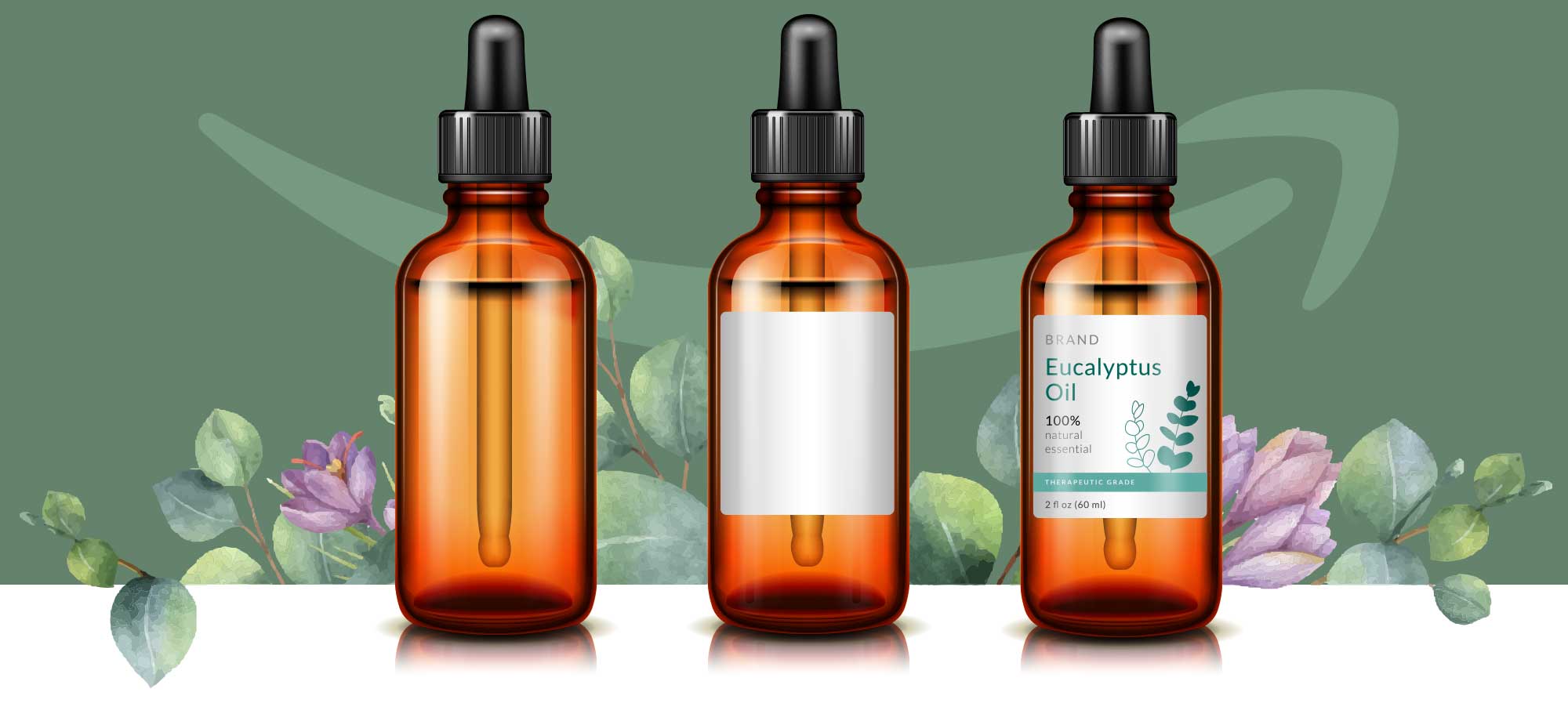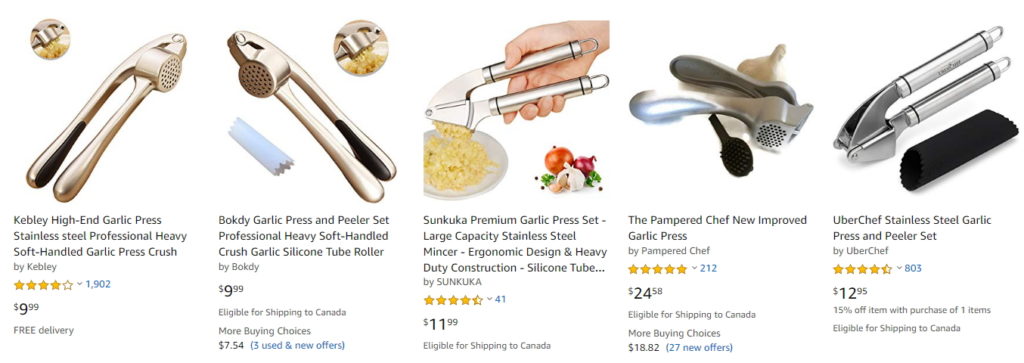
Are you interested in starting a private label Amazon business? Or are you just interested in finding out more about what a private label business exactly is?
In this article, I'll discuss what a private label business is, how to start one and share some of my experiences.
What is Private Labeling?
With the explosion of popularity of selling on Amazon (and prior to that, eBay) the word “private labeling” has become a huge trend. But what exactly is private labeling?
Private Labeling is essentially buying inexpensive off-the-shelf products from China and branding them under your company. These products are already being manufactured by suppliers, in other words, you're not inventing products. You're buying pre-existing products and normally only changing the packaging or making light product changes. Take a look at the search results for garlic press on Amazon. You can see that of these five products shown here, almost four of them are nearly identical except for one thing: their brand name.

In terms of e-commerce businesses, private label businesses are best contrasted with drop shipping businesses. In a drop shipped business, you buy somebody else's products and resell them (you never brand them under your company). With a private label business, you physically own inventory. The downside to this model is there's a higher capital requirement and more product development work required. The upside is that there are higher margins and less competition.
Related Listening: Episode 132: Drop Shipping vs Private Labeling, a Friendly Debate
The word private labeling has many synonyms: white labeling, off-the-shelf, original design manufacturing (ODM), etc. Whenever you hear someone using these terms they almost always mean the same thing.
How Do You Make Money With Private Labeling?
The vast majority of people with private label businesses make money selling their products through Amazon FBA. In the eBay vs Amazon wars, Amazon is now the clear cut winner. Many people are still oblivious to the fact that Amazon is now a marketplace just as much as eBay with third-party sellers now making up over 50% of all of Amazon's revenue.

As I showed in the above example with garlic presses though, there can often be extreme competition for essentially the same products. So how do entrepreneurs compete and be profitable? They do so in a few different ways:
- Find new products that do not yet have a lot of competition
- Lightly improve the product either physically or through better packaging
- Improve the marketing such as better photography, descriptions, advertising etc.
To succeed in private labeling the formula is basically to find products with low competition, improve the packaging and/or product, and market them better. The real key is to find the perfect product(s) to develop and we address that in our guide to finding the perfect product to import and sell on Amazon.
Can I Still Make Money in Private Labeling in 2018?
You can definitely still make money in private labeling. I sold my previous private labeling business selling boating accessories for just under $1million in 2016 and I started another private label business and achieved nearly $1million in revenue in just over a year in 2018. However, there is now more and more competition. However, private labeling is also now easier in many ways mostly through a great abundance of services and education available. When I got started around 2008 there was almost no information available about private labeling.
As competition has increased two trends have resulted: profit margins have been pushed down and the standard for improving products has been raised. In other words, importing some products from Alibaba and simply putting your logo and bar code on them is no longer sufficient to make a ton of money.
How Much Money Can I Make Private Labeling from China?
So how much money can you make? Well, probably more than you think while at the same time, less than you think. Below are the cost and prices for three of my top selling products.
| Cost in China | My Selling Price |
| $20.10 | $59.99 |
| $24.50 | $72.99 |
| $29.80 | $89.99 |
In most cases, I aim to sell products for 3x more than what I purchase them for. Sounds great doesn't it? Buying something for $20 and selling it for $60 is a great return. Well, it is great. BUT, remember, all businesses have expenses. In a private label business the most common fees are Amazon Referral Fees, Amazon FBA fees, Sea Freight, Returns, and Advertising. Generally for most businesses, they will make a 15-25% net margin after the dust settles.
The greatest benefit for most people, aside from money, will be the schedule and location flexibility. While a private label business is not nearly as a location independent as a drop shipping business it is still possible and I have run multi-million dollar private label businesses from every corner of the globe from Kyrgyzstan to North Korea. It also offers very convenient schedule flexibility – for the most part, there is no need to be tied to your computer during certain hours of the day.
How Do You Start a Private Labeling Business?
This is one of the reasons why Private Labeling has become so popular. To import products from China into America you need very little. Amazon FBA has made this even easier (long gone are the days of having to physically ship items yourself). Many people think you need some big fancy import-export license to import products. You don't! In the case of America, you normally only either need an EIN or a non-resident importing ID (see our article How Non-Americans Can Import and Sell in America). This is something any customs broker can set you up with very quickly and easily.
Top 10 product categories on Amazon 2020
Choosing a category to sell in the market will depend on the results of your product research, the competiveness of the category, and the demand for the product. Take a look to the most popular categories third-party sellers sell in:
Home & Kitchen (office chair, office desk and blender)
Sports and outdoors (yoga mat, camping and hammock)
Toys & Games (puzzles and lego)
Health & Personal Care (medical masks, hand sanitizer and wipes)
Electronics (iphone case, webcam and headphones)
Beauty (nail polish and make up
Clothing, Shoes & Jewellery (bandana)
Baby (baby gift)
Garden & Outdoor (bbq and patio furniture)
Tools & Home Improvement (portable air conditioner)
Also we included some of the trending products that are winning most clicks and conversions on strategic search terms in 2020.
In general, the process to start your business would look something like as follows:
- Find a product to import from China (see Finding the Perfect Product to Import from China and Sell on Amazon)
- Import it from China (see our Mega Guide to Importing from China)
- Open an Amazon Seller Central account and send your inventory there
In general, y the minimum amount of money you need to start a private labeling business is $2500-5000. I realize this is going to be a deal breaker for many people. If you're in a situation where cash is a tight, a drop shipping business may be better for you which has much lower capital requirements.
What are Some of the Negatives about This Type of Business?
Private labeling isn't all roses. There's some crappy parts about this type of business too (although I of course think the pros outweigh the cons. Big time). Here's the drawbacks:
- It requires money to invest in inventory
- You have to hold inventory
- The upfront efforts are high
The biggest downside to this type of business, as I mentioned before, is the money required to purchase inventory. Not everyone is in the position to be able to spend $2500+ in inventory. Inventory also becomes a major pain to deal with over time. And lastly, there is a very high upfront time cost to developing products. You will spend a ton of time, in the beginning, find products, finding suppliers, developing those products, and getting them listed for sale. Thankfully, after that, the time requirements are far lower.
Conclusion
Hopefully, this gives a good summary of what exactly private labeling is and how to get started. Overall, despite the increased competition private labeling still is an excellent opportunity for those willing to put in the time and effort to develop great products.
Do you have any other questions about how to start a business private labeling? If so, please comment below.




Hi Dave,
I’ve recently become interested in the thought of pursuing an online importing venture to sell products on Amazon, and eventually brick and mortar shops once I figure out a few of the importing nuances. One of my concerns is how does one protect their private label from being taken over by someone else? Would you have to trademark, copyright, or licence your brand?
Regards,
Robb
It depends what you mean by take away. If you’re worried about making a “Robb Outdoor Furniture” brand, then you can add the TM symbol beside your brand, for free, and it lets the world know you reserve the rights for this brand name. At some point you can officially register it, but I wouldn’t worry about that until you get some traction.
Hi Dave,
Amazing info, first time I read your web site and appreciate the efforts you guys put into communicating all these details. Two questions:
1. How to find quality companies that do offer private labeling and design modifications?
2. What’s to stop them to compete directly with you or sell your design to others if it turns out to be a good design?
Thank you!
Hi Jack,
1) Check out our How to Import from China article.
2) Not much. Trust with the supplier is the most important thing.
As a third party seller on amazon, should you have a liability insurance? I am a Canadian living in the US and would like to start selling as a foreign Canadian on amazon.com.